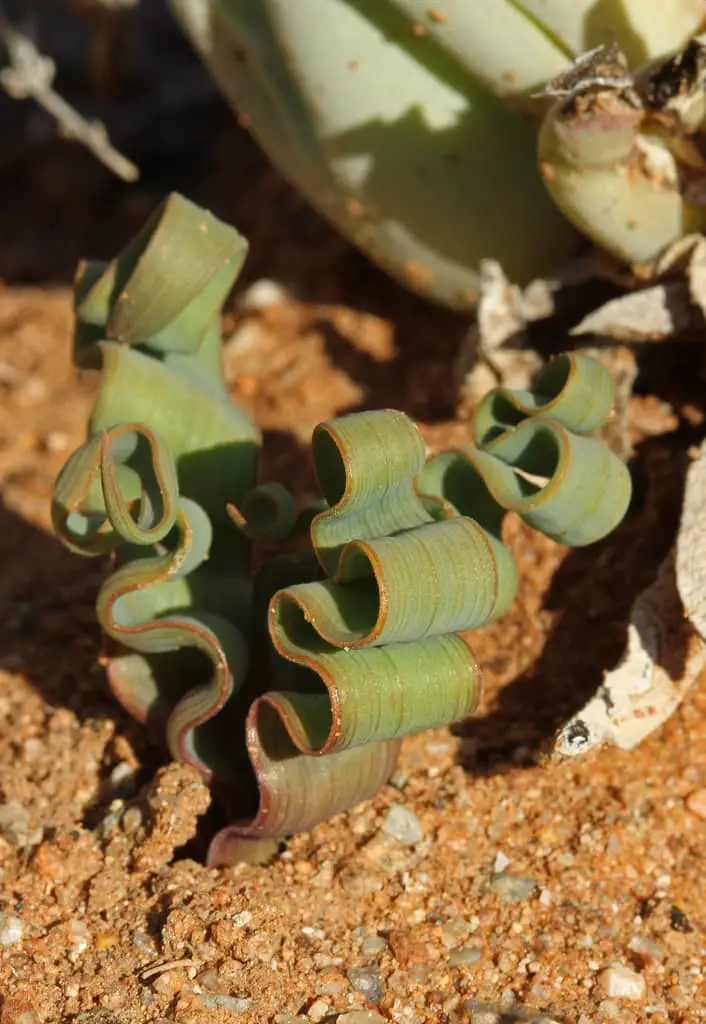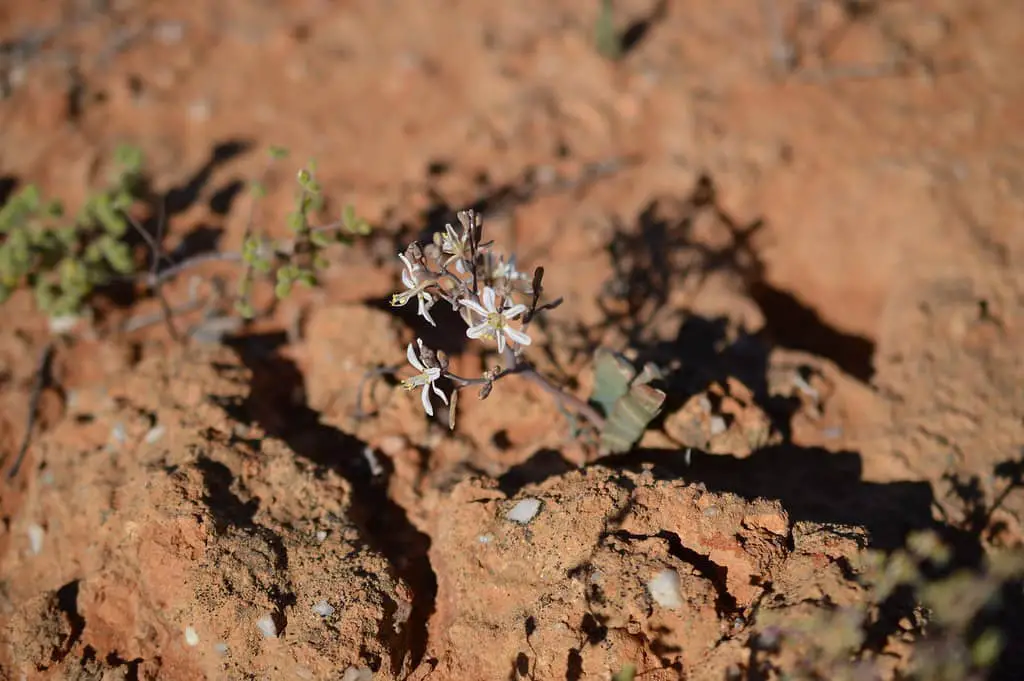Trachyandra tortilis are grown slowly and live longer compared to any other plant in the succulent category. This plant is suitable for the house plant as the species complement your interior. Trachyandra tortilis doesn’t require much maintenance and comfortably grows in indoor condition. The well-lit room with the proper draining sand soil is sufficient for the plant to grow.
What is Trachyandra tortilis?
Trachyandra tortilis succulent grows up to 25 cm tall. It is a perfect indoor plant that doesn’t require much water. Like other succulents, the plant requires dry soil with moderated water during growth. It would have a green basal leave of 10 cm in length with 2 cm in diameter. The species’ leaves are linear in size, which gives the plant its unique shape and size. As the plant grows, it finally flowers the pale pink.
The unique sites make the plant look amazing when kept indoors. It will be one of the attractions in the house. Some people may think the plant is not real due to the unusual shape of the leaves. Trachyandra tortilis succulent is native to South Africa and Madagascar. It is a sporadic form of succulent plant which is hard to find for cultivation.
If you are lucky, you may find the seeds or the actual plant in some online stores. It is worth adding them to your indoor garden. This succulent is one of the plants whose leaves are formed in a curly shape and liner in the vertical form. It can grow up to the height of 24 inches. The curly leaves would have a fresh green color that enhances the beauty of the plant. It feels strong to touch the leaves.
How do I identify a Trachyandra tortilis?

It is easy to identify the Trachyandra tortilis succulent in its first appearance. The unique shape of the leaves makes the plant easily identifiable. The strange size of the plant makes the plant rare in the succulent category. Green ribbon-like succulent leaves fold and coil in circular form, making it love attractive. The plant doesn’t require direct sunlight.
However, you need light in the room where the plant is placed in the room. It can grow under the light coming from the indoor bulb. The plant remains around 25 inches in length. It is one of the attractive houseplants found in the succulent family. You can even have them on your dining table or the dressing table to enhance the room’s aesthetic.
| Botanical Name | Trachyandra tortilis |
| Common Name | String of hearts, Rosary vine, Chain of hearts, Chinese lantern |
| Plant Type | Succulent, Vine, Evergreen |
| Mature Size | 2-5 cm. tall, 2 – 4 m. widespread |
| Sun Exposure | Partial Sun |
| Soil Type | Well-drained, Fertile |
| Soil pH | Acidic, Neutral |
| Bloom Time | Summer, Fall |
| Flower Color | White to a pale purplish-red |
| Hardiness Zones | 9 – 12, USA |
| Native Area | Southern Africa |
| Toxicity | Non-toxic |
| Average price | $8.99 |
How do you take care of a Trachyandra tortilis?
Trachyandra tortilis succulent requires special care due to its unusual shape. When the plant is ignored and no care is provided, the plant will grow in a unique shape, and sometimes, it may die. In most succulent plant species, you do not have to spend much time watering them or other caring procedures.
However, you have to be more alert. They are quite delicate species in the succulent family. Also, the rare form of the plant makes it more expensive to purchase. Therefore, you would not like to damage them or let them die. The Trachyandra tortilis is not beginner-friendly.
Size
The Trachyandra tortilis grows upto 10 Inches (25 cm).
Growth
Grow slowly in the normal weather condition.
Light Requirements
Trachyandra tortilis is not a cold-hardy plant. It can easily grow indoor without needing direct sunlight. The plant comfortably thrives under the temperature range between 41 to 59 F. Like any other succulent plant, and the plant require sunlight to stay healthy.Put the plant in the bright sunlight or near the windows where the light would shine on the leaves. It can grow in the natural habitat when the plant receives 6 hours of daylight. Avoid direct sunlight, which may result in sunburn. It may cause the leaves to develop black spots.
Temperature and humidity
Moderated between 41 to 59°F
Is it cold, hardy?
No, the plant is not cold hardy.
Water requirements
Watering the plant should be conducted in the moderated practice. Based on the season, provide a sufficient amount of water to the plant. In the rainy season, when the air’s humidity is high, the soil would be moisture. During this season, reduce the intact of the water. In contrast, the summer season would need more water in the soil, so reverse the process.
Also, in the early stage of plant growth, give the plant an adequate amount of water. Ensure that the soil has the proper drainage system to remove the excess water. The plant goes dormant during the summer, so the plant would require less water during this period, so it does not need to give more water during this period.
In the summer month, the succulent would not require much water to survive. Put the water when the soil becomes completely dry. During the fall and winter months, the plant increases the growth, so you should water the plant more frequently. Pour the water every 2 to 3 weeks. Follow the soak and dry method to water the succulent. Water the plant when the soil is arid, and wait until the soil soaks the water. Let the soil dry completely again before you water the plant.
Depending on your location, the soil would take time to dry from the bottom. Always check the bottom layer as well before you pour the fresh water into the succulent pot. Sometimes, the soil’s top layer becomes dry under direct sunlight, but the bottom layer would have moisture. Pouring more water would result in wet soil, and it may damage the roots. Remember that the Trachyandra tortilis is very sensitive to overwatering. The water surface would attract the diseases, and your plant would die.
Pot And Soil Requirements
The Trachyandra tortilis require potting soil that easily drains the water. Therefore many household succulents are kept in the sand or clay soil. The pot with the easy water drainage system makes it a perfect fit for the succulent plant. Terracotta or clay are also used instead of sand. It provides a healthy environment for the Trachyandra tortilis plant. The plant’s characteristics allow the air and moisture to penetrate easily from the pot’s side, giving the soil sufficient space to dry. you have to make sure the soil is well drained.
Flowering and Fragrance
Showy Other: Ephemeral
Where to Plant?
It can be planted indoors in a small size pot. It would help if you had moderated room temperature, not too hot and not too cold, to propagate the plant.
Fertilizer and time of year
Use the organic fertilizer at half of the strength. Use winter season when the plant is going through development.
Dormancy
Summer is the time when the plant goes through Dormancy.
Other plants Pairs Well With:
Any succulent could be pair with the plant.
Can be toxic to pets
Like any other succulent plant, the Trachyandra tortilis could be toxic to the pet. Keep your pet away from the plant.
Handling the plant
Utmost care is needed for the plant. Especially the watering method needs to be appropriately managed.
Common bugs and Illness Issues
Trachyandra tortilis is a naturally disease-free plant. However, sometimes the insects may try to harm the leaves of the plant. Mealybugs try to eat the spiral shape leaves, and the plant’s unusual shape also the best hiding place for the tiny pests. If you experience the plant is not growing, as usual, the reason may be the pest invasion causing the plant to stop growing.
Special Care Tips
Keep the plant under the sun to produce the natural habitat. The plant would require the perfect watering condition to thrive.

How do you grow Trachyandra tortilis?
There are two ways you can propagate the Trachyandra tortilis plant. One is from seeds, and another is from cutting the leaf. Use the seeds to plant the tree like any other plant. The seed may take a long time to propagate as initiating the roots’ growth requires more time. Generally, using the seed is not recommended method. Put the seeds in the well-draining soil moisture. Water them frequently and keep the soil dry as much as possible.
Many plants growing used the leaf-cutting technique when it comes to growing Trachyandra tortilis. Choose long and fully plump leaves. Dehydrated and flat leaves should be ignored. Also, the leaves which have spots or marks should be avoided. Gently remove the leaves from the stem. Carefully cut the leaf from the mother plant. Use the scissor instead of a knife for the sharp cut.
Ensure that you are removing the leaf from the base attached to the stem. Next, keep the leaf in the container to dry out completely. When the leaves are dehydrated, dip them in the soil with a well-draining succulent potting mix. Keep the pot away from direct sunlight for few days. In a month’s time, you will notice the little pink roots appearing on the stem. To avoid the roots from rotting, wait until the soil dries out completely.
How do you repot a Trachyandra tortilis?
The repoting is easy and doesn’t require much work to move the plant from one pot to another. You gently remove the entire plant from the pot and remove the excess soil from the root. Clean any old soil before repotting. Also, check for rotted roots or damage to the root. Cut any rotted part before repoting it in the new pot. Once the reporting is done, keep the soil to dry completely before you pour the water. Ensure that the unique pot has a proper drainage system to remove the excess water quickly.
Trachyandra tortilis plant benefits
- The plant helps you to purify the air.
- Increase the humidity indoor.
- The appearance of the plant would help you to improve your focus and productivity.
- Reduce stress and anxiety.
- The plant also possesses medicinal properties like agave, yucca, aloe, etc.
FAQ
Is Trachyandra tortilis an indoor plant ?
Yes. You can have them indoor to improve your aesthetic of the home.
Is Trachyandra tortilis toxic?
The plant is considered a non-toxic plant. However, it is advisable to keep the pet and children away from the plant. Like any other succulent plant, the Trachyandra tortilis may develop a toxic substance that may cause the pet to get ill when they contact the plant.
Does Trachyandra tortilis need direct sunlight?
The Trachyandra tortilis need sufficient sunlight to grow. It would require six hours of sun per day to thrive in a healthy condition. Newly planted succulent would not require much sunlight. However, as the plant grows, you can introduce them to sun exposure for rapid growth.
Can Trachyandra tortilis be rooted in water?
No. The Trachyandra tortilis is a succulent plant that doesn’t require much water to grow. The dry soil with the proper drainage system would keep the plant in good shape, and it would allow the to grow faster.
Should I mist my Trachyandra tortilis?
When you use the soil that quickly removes the soil’s water, you do not have to mistreat the Trachyandra tortilis. The water draining system would solve the problem, and your plant will thrive in the natural habitat.
Does Home Depot sell succulents?
The home deport have various types of succulents for online buyers.
Credit to : WEIRD but TRUE
